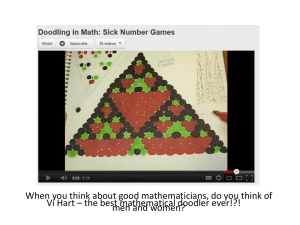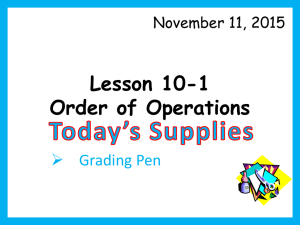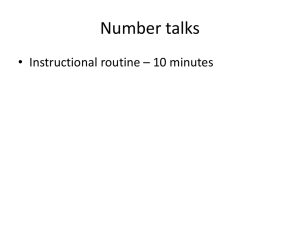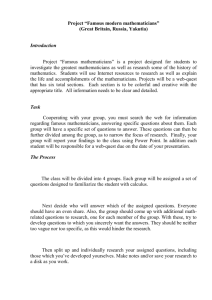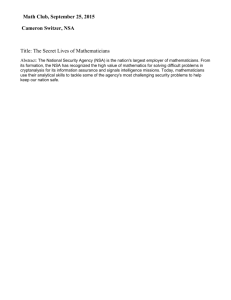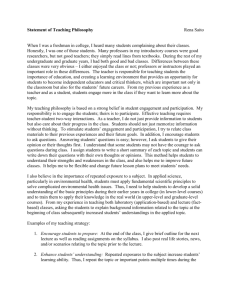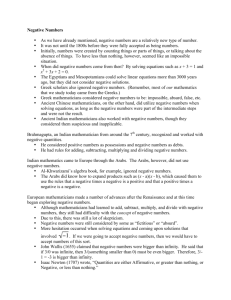Math 116 CALCULUS II BACKGROUND INFORMATION June 9
advertisement
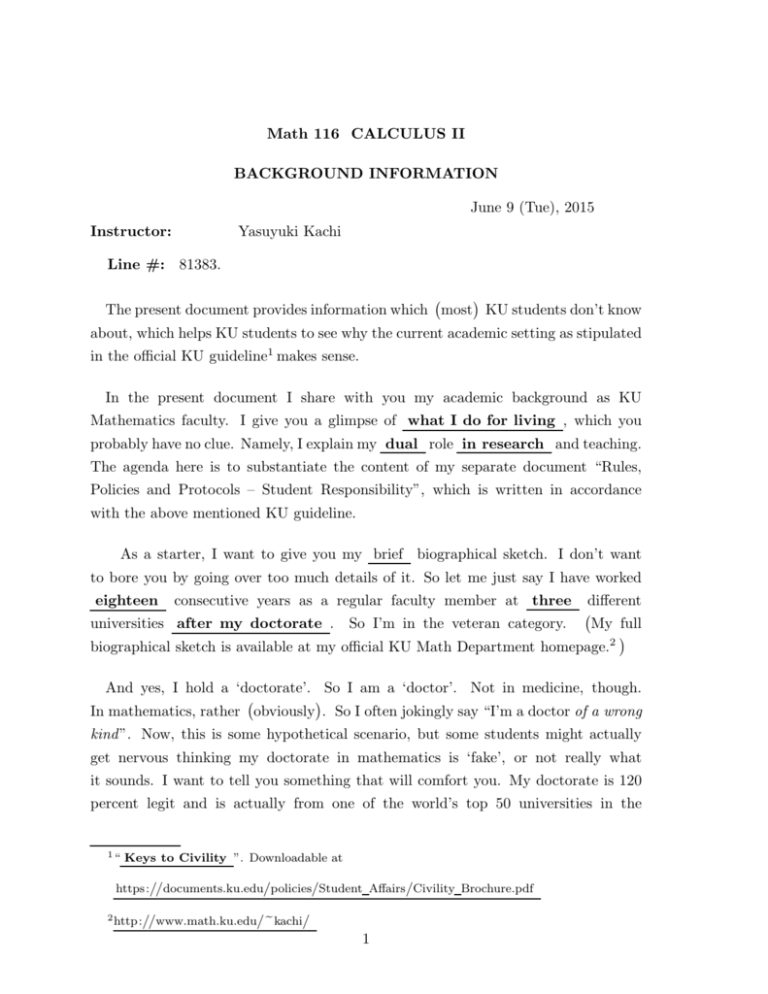
Math 116 CALCULUS II BACKGROUND INFORMATION June 9 (Tue), 2015 Yasuyuki Kachi Instructor: Line #: 81383. The present document provides information which most KU students don’t know about, which helps KU students to see why the current academic setting as stipulated in the official KU guideline1 makes sense. In the present document I share with you my academic background as KU Mathematics faculty. I give you a glimpse of what I do for living , which you probably have no clue. Namely, I explain my dual role in research and teaching. The agenda here is to substantiate the content of my separate document “Rules, Policies and Protocols – Student Responsibility”, which is written in accordance with the above mentioned KU guideline. As a starter, I want to give you my brief biographical sketch. I don’t want to bore you by going over too much details of it. So let me just say I have worked eighteen consecutive years as a regular faculty member at three universities after my doctorate . different So I’m in the veteran category. My full biographical sketch is available at my official KU Math Department homepage.2 And yes, I hold a ‘doctorate’. So I am a ‘doctor’. Not in medicine, though. In mathematics, rather obviously . So I often jokingly say “I’m a doctor of a wrong kind ”. Now, this is some hypothetical scenario, but some students might actually get nervous thinking my doctorate in mathematics is ‘fake’, or not really what it sounds. I want to tell you something that will comfort you. My doctorate is 120 percent legit and is actually from one of the world’s top 50 universities in the 1“ Keys to Civility ”. Downloadable at https : 2 http : documents.ku.edu policies Student Affairs Civility Brochure.pdf www.math.ku.edu e kachi 1 US News ranking.3 By the way, I am not bragging. I know some students get offended, or find it distasteful. The sole reason I go over this is I don’t want you to possess a wrong idea you are being taught by someone whose credential is uncertain, or questionable. Providing this information is what I consider as appropriate for Day 1 of the semester. So, please don’t get offended you really shouldn’t . Now, my colleagues = co-workers here at KU Mathematics Department more or less have the same or similar academic backgrounds. In particular, we regular faculty at Mathematics Department are all doctors. How do we call ourselves? Sure, we are ‘professors’, that’s perfectly accurate, but at the same time the word ‘professor’ refers to ‘professing’, where the latter is generally understood as a synonym of the word ‘teaching’ but with a slightly more anachronistic connotation. The truth is, ‘professing’ is broader than ‘teaching’. There is actually a word that accurately mirrors what we do for living. We call ourselves ‘ mathematicians ’. On the other hand, you and I both know that in our subculture, the word ‘ teacher ’ can be unjustly used discriminatorily. I personally request you not to use that word if at all possible.4 I want to pick one day and spend a portion of our class time to elaborate this, what the term ‘mathematicians’ exactly refers to, how we are professionally-trained certified individuals, and are more than qualified to teach you mathematics, and most importantly, what we r eally do for living other than teaching , namely, research . I will read my draft called ‘ Pitch ’. So please read the remainder of the present document as a prelude to it. Know that, other than that one occasion, I will never revisit my personal academic history and credential ever again in the classroom except an occasional reference my perspective is that of a professional mathematician. Is that fair? Now, the next item gives you some picture nuts-and-bolts of what an academic job is all about. 3 http : //www.usnews.com/education/worlds-best-universities-rankings We (college professors) take this sort of rankings with a grain of salt. I never discredit those who implemented a system to rank universities like this one. 4 For the primary and secondary educations, I think ‘educator’ is a good word. Other synonyms with no negative connotations (applicable to the higher education too): ‘Lecture giver’, ‘mentor’, ‘pedagogue’, ... A book with a related content: Taylor Mali “What Teachers Make”, Berkeley Trade, 2013. (It does not denounce the use of the word ‘teacher’, though.) My analogy is that ‘chef’ is more polite than ‘cook’. 2 • A math professor’s day. Sarcastic critiques of Academia may wish to propagate a certain perception about our “academic lifestyle”, that we, university professors, spend most of the day in a golf course, a tennis court or a fitness club other than a couple of hours of teaching. How accurate is that? The following describes my typical day.5 I do not see the lifestyle of my colleagues at The KU Mathematics Department to be any drastically different. ♦ I wake up early enough 6:30am so I have time to write up quizzes. I do it until the last minute: today I teach at 10am. Dive into my office and print off my quiz. Make copies in a hurry, and rush to Malott Hall to teach my 10 o’clock class. I prefer to arrive early but today I arrive only at 9:59am. Then teach until 10:50am. A few students were lining up, wanting to ask me questions. So I got out of the classroom at 10:55am. Rush back to my office. I have 20 to 25 minutes to respond to emails. Usually at this point of the day a few students come by and ask questions. I always oblige. Today three showed up. This continues until 11:30am. Unfortunately I have to ask them to leave because 11:30am is the time for me to meet with Joel, my graduate Ph.D. student. Meeting with Joel is the highlight of the day. Joel and I do intense research together on some cutting-edge level topics. Joel is savvy on computer software. Joel and I do lots of interesting computations, to gather data that support the validity of our working hypothesis. The content of our discussion varies from day to day. Joel is a super-duper smart guy. Having Joel as my intellectual assistant is a luxury. Working with him side-by-side is a pure pleasure, an utter excitement. How long my discussion with Joel lasts varies. Often I find time for a quick lunch. But today I do not seem to have enough time. I said bye to Joel on 1:40pm, and I have another class to teach at 2 o’clock. By the way, this means Joel also sacrifices his time for lunch, which he does not seem to mind at all. Anyways, by skipping lunch, I have secured fifteen minutes to spend in my office before the next class. I use this time to finish off my other emails, and I have to go down to the main office in my building for some clerical work. Then I dash to Malott. 5 This is based on my record and recollection of the events happened on Monday, May 3rd, 2010. This is not an exact recounting of that particular day, but all the events happened over a protracted period of time, and it more or less reflects my typical day. 3 At 2pm, I teach my second class. At 2:50pm, I return to my office. At this point of the day I am usually a little spent, but I got to do what I got to do. I renew my course webpage. I make sure to keep updating my course webpage without delay. I also use this time to write up solutions to quizzes, some hints to some assignments, etc. How long these take depends and somewhat unpredictable . Today I will likely end up staying until 6:30pm or around. But sometimes all the work can be done with my laptop, so I get out early like 4:30pm and go to which ever place offers a comfy laptop working environment and a soothing herbal tea. At this time, I also do my most important work of the day — meditate and streamline the theory Joel and I are developing, which will be the content of our forthcoming joint publication. In doing so, I reflect the discussion with Joel earlier today, and do lots of computations myself some I scribble in my notebook, some I simulate on the computer software installed in my laptop . I also read articles and papers written by other mathematicians and reinforce my understanding of the picture of what results theories are known pre-existing. The rules, patterns and formulas that I may possibly discover tonight, tomorrow night, next month, or next year, that owe significantly to collaboration by Joel, will eventually accumulate and be ready to be shared with the rest of the scientific community, in other words, they will become what deserves to be called a “scientific discovery”. This aspect of my work, called “research”, and my teaching, have little to do with each other. So I have to be good at switching gears back and forth — from teaching mode to research mode, and vice versa. I have to go to bed reasonably early, because tomorrow I will have to wake up early, to write up quizzes. I try to avoid pulling all nighters as far as possible even though sometimes I have no choice. I will have to prepare for my talk scheduled in two weeks in front of a professional audience. A common wisdom in our professional circle is giving one sloppy talk is a professional suicide. Thorough preparation for a talk requires extra time and energy. Often, middle of the night is the only time for such a thing. Next thing I know, I hear birds chirping, and the sun rising. Go back to the first paragraph, repeat . ♦ 4 • Point: In my separate document called “Rules, Policies and Protocols – Student Responsibility”, I asked you to acknowledge and respect the fact that I am in the research front, citing its rigorous and competitive nature encapsulated in a single buzzword “publish-or-perish”. You probably got the idea from the last two pages of the present document “A math Professor’s Day” that, in our line of work, literally every minute counts. That’s because we always walk on a thin ice, that someone else somewhere in the world might be just about to publish results which you had been accumulating. If the timing of your submission comes after somebody else published the same result as yours in the same or a different journal, then your submission is rejected, so your months and years of effort is wasted. In other words, there is no recognition for the ‘second place’ person in each race. Winner takes all. This rule of the game is called ‘the priority rule’. Here, not all scientific journals are equally prestigeous. Top-notch journals are highly selective and only publish highly original and groundbreaking results, low quality journals publish incremental results, and there are journals in-between. Pros and cons of shooting for original results: Pros – It is less likely someone else comes up with the same result before you. Cons – It is harder to generate results that are deemed original, and at the same time legit, meeting the standards of rigor of the discipline. Also, it slows you down. Interestingly, there are countless examples in the history of mathematics that multiple mathematicians came up with the same, groudbreaking and highly original, results at once independently, unbeknownst to each other. The oldest example that comes to my mind is Newton and Leibniz6 . The two were fierce archrivals. More on this story later in class. As we speak, recently in May, 2013 , a mathematician at University of New Hampshire named Yitang Zhang has published a truly remarkable result, a super-major breakthrough: he has solved the so-called ‘weak twin prime conjecture’. This became a sensational news when it broke out, literally everybody in my professional circle was talking about his accomplishment for quite some time.7 A dreadful consequence: If you happened to have been working on the same conjecture, you would have been doomed. It’s like a death sentence. Luckily, I was not. Now, what if I quit research and just teach? I know that’s what KU students like to hear. My answer is, no, never, because for one, KU expects us to do research. We are hired for our research credential. Actually, “publish-or-perish” is the motto 6 Isaac Newton (1642–1727), Gottfried Wilhelm von Leibniz (1646–1716). Both invented calculus. Y. Zhang’s paper appeared in Annals of Mathematics, one of the three (or so) most prestigeous peer-reviewed mathematical journals in the world, ‘the epitome of quality’. 7 Dr. 5 that the university emphasizes to its own faculty, not the other way around. The truth is, any conscientious research mathematicians including myself prefer to take time to do profound and meaningful research even with a caveat of a slower rate of publications. But our university expects us to amass a publication record at a fast-and-furious pace. This is not just KU, but the same is true worldwide. For two, I teach because it is an obligation that comes with my research job here at KU. Not the other way around. My aspiration as a child was to become a researcher, not a teacher. But nearly every research position comes with teaching obligations. This actually makes sense, though. We, researchers, are naturally best positioned to share the knowledge in our specialty with the general public. It has been this way since the thirteenth century, when Oxford University in England was founded as the first university in the English speaking part of the world in 1246 .8 So be aware that you criticize our rationale that we, KU faculty, do research and it means you are challenging the raison dêtre of universities and the entire history of academia. So the bottom-line is my job is extremely time-sensitive. Still, I place my teaching job high in my priority list, it is indeed my second highest priority: I have a desire to teach my class without compromising the level of perfection. And that’s why I do not invite a situation where my precious time is eaten up by the consequence of some confrontation and unreasonable conflicts with my students. The above explains why I and my colleagues likewise may not always be able to accommodate your request to meet for questions outside of the regularly scheduled office hours, even though like I said I welcome your email appointment requests. I will do my best to work with you and try to figure out a mutually convenient time, but only within the given time-constraint, the degree of which varies sometimes I am super-duper busy, some other times I am relatively flexible . Also, I may or may not be able to respond to your email immediately, if your email is not in absolute emergency. This is consistent with the KU guideline “Keys to Civility”. • Now my next agenda is to deter some students who would otherwise show a ‘possessive’ gesture toward me. You must have read my separate document “Rules, Policies and Protocols – Student Responsibility”. In it I stated that students do not own us. Students are not our boss. So the following is not applicable to you if you 8 Cambridge University was founded 35 years later (in 1281). 6 do not see my job as to do everything you say. Probably, those ‘bossy’ students see everything from the capitalism viewpoint, they see their position at KU as one that parallels that of the ‘consumers’ and see themselves “always right”. So they demand us to provide various “extra-curricular service” that are not warranted examples are also found in the official KU guideline “Keys to Civility” . My retort: • A crazy idea: A crazy idea: Let’s make your tuition free. The government covers you. Parents do not worry financially about sending their kids to college. But instead, for any extra courtesy we provide such as responding emails and writing recommendation letters, we charge you — This is consistent with the common practice in other professions: If you borrow a professional time on medical legal experts you will be charged on the hourly basis, as much as the nature of the service rendered. But our current system, at universities, is not that way. I hope that our “courtesy, no-charge, system” is not making our students feel they can take us for granted. I hope it does not give my students a false sense of “entitlement” . I am so proud to tell you: Last semester Fall 2014 , I made clear of all the above to my students on Day 1. Then nobody in my classes ever spoke to me out of the sense of “entitlement”, and I really appreciated their fine demeanor. On the other hand, I still eye-witness that some KU students talk to my colleagues with lack of candor. I wonder if those “entitled” students would think twice of ever talking to their ‘coach’ the same way, if they were an athlete. If you understand that a player must observe the integrity of your football field or your basketball court, then you should be able to understand that the same concept applies to your classroom. • “In Students We Trust”? There is a wide-spread controversy in North America, and it does not ever seem to have reached a consensus, as to whether the students are Gods. Please quit snickering and listen to what I have to say. My take is, students are not Gods. Disclaimer: I am not a Theologist. But I know God is almighty, and as such, God knows everything. Students are here to learn. If they knew everything beforehand, then there is nothing to learn. But students do not know many things and that is why they come here to learn. As long as they are in the learning process they are not Gods. They are humans. 7 We, professors, are humans too. Yet I can safely claim that our knowledge in our field of expertise is superior to that of yours. That’s why it makes sense to you to invest your x-number of years of your time and come here and gain knowledge and skills from us. We provide knowledge and skills. That is what you are investing for. All I ask you, my students: Please try to show a fair amount of respect for us, not for being older than most of you, but rather for our scholarly credential which none of you can match I assume . • Is “our” system in the United States common? As mathematicians, we travel abroad and also have a very good acquaintance with colleagues abroad. We have a fair amount of knowledge of how the system in abroad works. Office hours, assignment and grading of homework, emails, recommendation letters, etc, are not a part of obligation for our equivalent counterparts in many other countries. In some countries, entering the building where your professors’ offices are in is prohibited. In some countries, there is no assignment of homework. As far as the teaching goes, your professors’ role is pretty much just lecturing, and administering just one exam, namely, the Final. Each professor has an “assistant”, and it is the assistant’s job to wipe off the chalkboards. The authority of university professors is absolute. The social status of professors is paramount. Questioning your professors’ way of assigning your letter grades is out of the question. In their way, your grade is determined solely by just one exam for a course. Nothing else matters. Isn’t it scary? But that’s how it works in many places outside of the United States. From my point of view, this way, my equivalent counterparts working at universities abroad have an edge in conducting research. Now, how does it go over here? We constantly monitor our students’ progress — I usually know all my students’ names, and more than just their names which is when I teach a normal size class . We routinely offer you office hours in some cases, my TAs offer them , review sessions, recommending you for tutoring/grader job, words of encouragement, .. I must tell you, that you are very very fortunate in this sense. 8 ⋆ Respectability of academic jobs. One of the students whom I recently taught in one of my undergraduate classes here at KU was earnest enough to listen to my “take” on the following subject, and saw my point, even though he initially held a different view. I don’t know how many students in this class are aspiring to become a college professor. Regardless, just think about it: We all want to live in a sufficiently intellectually mature and scientifically advanced society. But what is the society’s intellectual maturity after all? A sound answer: How much those experts scientists and mathematicians of various scientific disciplines understand their own scientific disciplines. To how much extent physicists understand ‘blackholes’, for example. Of course, there are mathematics counterparts of the mystery of blackholes. So, don’t scholars scientists and mathematicians deserve some respect? I want to talk about the ‘respectability’ of academic jobs. This will also solidify the basis of my document “Rules, Policies and Protocols – Student responsibility”. So, the “respectability” of jobs. While it is generally considered acceptable to say that certain types of jobs are more “respectable” than others because of higher compensation, isn’t there a limitation or an exception? More specifically, it seems true that the perceived value of college professorship as a job is generally low, or at least not prestigious in North America , and this seems particularly true with math professors. Let’s spare the discussion on the lowest, the most sarcastic, description of it I ever heard, namely, we are the college kids’ ‘doormat’ — Presumably this has to do with the wide-spread false perception among the general public, that our job is full-time teaching it is false, as I made clear above , which is further compounded by the fact that, at universities unlike K-12 , ‘teaching evaluations’ are administered.* Granted such an observation is accurate, does that mean college professors, and math professors in particular, are less respectable than someone who makes more money? First, as I explained earlier, my colleagues and I ‘we’ hereafter are experts in various research disciplines of math. We all hold doctorates in math. We contribute to the advancement of the cutting-edge science, in areas of math. In our undergraduate classes we teach, we teach stuffs that are “ultra-basic”, to us not to the students . Boring, right? “Not at all”, that’s what we always say. And we mean it: We make our students enjoy the thrill of being the direct recipients of the knowledge and expertise we share with them. We never say we do not value *An insightful account: Steven Zucker “Evaluation of Our Courses”, American Mathematical Society Notices, August, 2010, page 821. 9 our students. We always say: We value our students who are earnest recipients of the knowledge. We are not at least I am not particularly interested in actively seeking our students’ favorite “buddy” figure status. We do not have to hear our students say they appreciate our work. We do not want a credit from students. We just do not want our students to take us for granted. We are good people, who happen to be skilled and proficient in our own scientific discipline. We never brag that we are ‘smart’ people, or complain that ‘therefore’ we deserve more money. And we are called a ‘doormat?’ Where is love? But in old days, our older counterparts were a little more “bold and obnoxious”. Our older counterparts used to identify themselves as “spiritual aristocrats”. College professors in old days did not shy away from declaring that they cherish genuine intellectual fulfillment over materialistic satisfaction. They solidify this statement, by simply reminding you the very fact that they have consciously given up more lucrative jobs outside of academia, matching their level of intelligence and specialized skills, of which they are in high demand. College professors are thus ones who willingly sacrifice their “opportunity costs”9 , and consider their own job as highly respectable, independently of the measure that is seemingly universally applied in the “real world”. One prominent economics professor at Harvard once said: “A number of Harvard graduates [...] have made distinguished careers in banking or government, or perhaps international organizations. Some have made large fortunes. When their names and achievements arise in conversation, there is likely to be an undertone of sorrow: ‘Rubinstein owns a quarter of Manhattan, and is regularly consulted by the President of the United States. I remember him as a pretty bright young fellow. Too bad he wasn’t quite good enough to become a professor at Berkeley.’ ” From “The University – An Owner’s Manual” by Henry Rosovsky, W. W. Norton & Co. (1991). 9 From “Teaching What You Don’t Know ” by Therese Huston, Harvard Univ. Press (2009): Whenever you make a decision to do something, the opportunity cost is the value of the next most attractive alternative that you didn’t choose. If you are choosing between going to a movie and taking your dog for a hike and you decide to go with the movie, you pay an opportunity cost to see the movie. The cost is the price of your movie ticket (obviously) plus whatever pleasure, companionship, and health benefits you would have enjoyed from the time with your dog in the sunshine (less obviously). 10 You might say this is an excessive manifestation of intellectual snobbism. Actually, the source is a twenty-year-old book, and the information in various parts of the book is a little outdated. The kind of mentality as described may no longer be ubiquitous. But we, college professors, who profess in this first quarter of the 21st century, an era with full of surprises — most notably the emergence of ‘the cyberspace’ and our obsession with it — still endorse that kind of an attitude. Of course, the author of the above quoted passage never means that a high-income job is unimportant. Now, all that being said, if I do not share with you the following information, then it will be disproportionate: Some top-notch world-class mathematicians are blessed with high figure salaries, some earn seven digit figures. So, by doing pure mathematics research, not pragmatic or useful whatsoever in terms of improving the quality of people’s life-style, or no entertainment value for the general public, you still earn that much money. Striking, huh? Of course, I am talking about an exception here. Some people who know us see that our income level is pathetic. So I attest we, math professors, are not the reason for your financial predicament. But that fact is not so intriguing. I am not jealous. What is intriguing, or more striking, to me personally is, some mathematicians willingly decline to receive high level of compensations and honors. Grigory Perelman is probably an extreme example: He has declined Fields Medal which was awarded to him.10 Here, the Fields Medal is the highest accolade in all pure mathematics, indeed, there is no Nobel for math, for a wrong reason, in case you didn’t realize. Perelman seems to live in a ‘complete platonic ideal’. This may sound corny, but we, mathematicians, are all, to a varied degree, ‘dreamers’, who could care less about ‘real life’ and would rather live in the ‘platonic’ world, where mathematical truths only matter. So in any case, what I am trying to say is, regardless of one’s perception of it in the context of the capitalism economy, I consider my job as very respectable, and very honorable. I approach my job of teaching this class with that “spiritual aristocrat” mentality, by which I do not necessarily mean I maintain dignified ‘scary’ demeanor. ‘Respect’ is the key word. And respect is mutual. In the classroom I deserve to be treated respectfully as a human being and as your professor, as much as I do my best to treat you respectfully and with a friendly gesture as my students. 10 Perelman’s biography “Perfect Rigor” by Masha Gessen, Houghton Mifflin Harcourt (HMH), Boston/New York, 2009. 11 • If you are rich, should I give you a special treatment? I insist to hold this scope and I will not change it depending on your parents’ income or your own income if you already have a job . It makes no difference if your parents donated a lot of money to this university. Namely, you are still my student, and I treat you as such, just as how I treat other students of mine. Trust me, I won’t get carried away if you either drive Mercedes or beaten-up Chevy truck or pink Prius or you don’t own a car but just ride a bicycle. Next, I would like to retort those KU students who either complain about, or think they can take advantage of, our ‘leniency’. • Are we ‘lenient’ ? Always, some students are more successful than others. Interestingly, some KU students who receive high exam scores and a good grade attribute their success in their math class to the ‘leniency’ on the part of the professor. Every semester, a small yet non-negligible number of KU students unilaterally complain that they have learned very little in their math classes. This happens even to those ‘well-liked’ professors at KU whose names students fondly talk about. Those students are apparently refusing to give a credit to themselves, for a reason I cannot think of. You might just say that it is appalling, but this phenomenon is glaring enough and perhaps warrants a further breakdown. The following is a ‘theory’: I suspect that those students are simply reflecting their math experience in our North American K-12 system. It is certainly understandable that, after going through their primary and secondary education, one eventually gets an idea that a math class is supposed to fail many students, and if it doesn’t, then something is going wrong, after having eye-witnessed so many of their peers actually had to suffer the ungracious fate. But let’s think about it: There is no logical reason that a math class should fail many students. Why can one say that? You might have never come across with the following line of thinking, but from a mathematicians’standpoint, in a perfect world, any math lecture should gear toward the audience who are infinitely ignorant beyond the prerequisite materials, of course and infinitely intelligent. Mathematicians = college professors in math = researchers in mathematics mathematical science have a natural inclination instincts to tailor their own math course that way, if there are no constraints. 12 By the way, this school of thought is often referred to as or linked to the so-called ‘Bourbaki-ism’11 . To stretch it further, in a perfect world, the math curriculum even in the primary and the secondary education should have a component to cultivate an understanding of what that mindset of mathematicians means and why mathematicians endorse it. My observation about some small group of KU students as mentioned above — if accurate — is an evidence that the K-12 math education, in its current form, does not necessarily foster or, it is not compatible with the general intellectual climate that encourages such an inquiry. By the way, that is not a criticism, it simply means that we don’t live in a perfect world. Yet some KU students’ palpable dissatisfaction disillusion? with math courses might perhaps be attributed to the fact that they had never been exposed to such an intellectual climate, or more specifically, their unfamiliarity with the idea behind ‘Bourbaki-ism’, though, once again, this is just a ‘theory’. It will be disproportionate if I do not address another polar-opposite character of some KU students that equally stands out: Some KU students seemingly consciously choose to sign up for a particular section of a math course taught by a particular individual based on the rumors “Professor X is ‘lenient’, Professor Y is not, ..” For this, I and my colleagues would emphatically say KU Mathematics Department uniformly holds very high standards. But saying that alone might not be convincing. So you need some elaboration here. The same logic as above can actually be used to substantiate such a claim, namely: A math class that is deemed ‘lenient’ by a lay person is most likely not. Every mathematician knows that the Bourbaki-istic style teaching is a very taxing and demanding affair on both ends, because it is supremely idealistic. Apparently, making an infinitely ignorant person knowledgeable save the assumption that person is infinitely intelligent imposes a certain amount of challenge on both the recipients and the provider of knowledge. As for myself, I do not employ the Bourbaki-istic approach in teaching this Math 105 class for the most part the same is indeed viable for upper-division mathematics courses . Yet I design my Math 105 class to be adequately challenging. Whichever letter grade you may ultimately receive from me, you deserve it. If you get a bad letter grade and get disappointed, sorry but you deserve it. If you get a good letter grade and get hyped, you have every reason to, you deserve it. If hypothetically you claim that my assignments and exams were too easy and that’s 11 Named after a team of prominent mathematicians in Paris in the 1950-60s called ‘Bourbaki’. 13 why you received a good grade, then I will show my assignments and exams around in my professional circle and have them render the second opinion. They will laugh if I tell them my students claimed those were too easy. Having said, there is always a possibiltiy that your knowledge and skills are above the level of Math 105. In other words, you are potentially a “super-duper” student. As highlighted in my document “Rules, Policies and Protocols — Student Responsibility”, if you feel you are “super-duper”, please let me know asap. I will test your mathematical aptitude, and depending on my findings I will either ◦ recommend you to take a different, more advanced, course such as Math 122 Calculus , or ◦ give you special assignments that will appetite. hopefully fulfill your intellectual • Finally, food for thought: A passage from Therese Huston’s book, about one Harvard Physics professor Eric Mazur’s experience.* Eric Mazur shared a story from his own days as a student to illustrate the interplay between motivation and active learning. It’s a surprising story from someone who’s internationally known for his dynamic physics classroom: The class I learned the most in was taught in the Netherlands by the most abysmal professor that I’ve met in my life. It was a quantum mechanics course I took as a physics undergraduate. The only place where you could hear what he was saying was in the front row. He would come in, shaking nervously, and he would start with his back toward the class, and start writing on the blackboard in beautiful handwriting, at the top left corner, and he would mumble and write and mumble and write. I would sit in the front row, sliding my table and chair as far forward as I could, furiously writing down everything I could. After an hour he would get to the bottom right corner *Eric Mazur is Balkanski Professor of Physics and Applied Physics, Harvard University. 14 of the board and then ask methodically, “Does anyone have any questions?” but nobody understood enough to even ask a question. Then he would walk out, smoke a cigarette outside for ten minutes, come back, erase the board, and start the second hour, writing once again from the top left to the bottom right. I would go home and spend hours trying to decipher what I’d scribbled in my lecture notes which I’ve kept to this day as a relic of the past . And by forcing myself to rewrite those lecture notes, I learned a lot. Even though it was an abysmal performance, I learned a tremendous amount.” “What that means”, Mazur continued, “is that if you have students who want to learn, you can do whatever you want; it doesn’t matter as long as you give them a source of knowledge.” From “Teaching What You Don’t Know ” by Therese Huston, Harvard Univ. Press (2009), p. 164–165. 15
